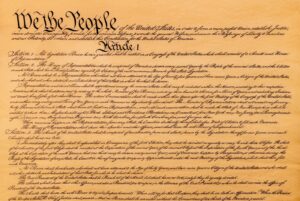Contemporary political discourse frequently presents a divide between those favoring economic liberty and those favoring government regulation. Yet prominent arguments on both sides tend to assume that economic systems aim primarily at the maximization of material well-being and satisfaction of personal preferences.
By probing classical reasons for and against private property, Thomas More goes deeper, addressing the objective needs of the human soul. In this way, he contributes to a framework for thinking about economic issues in terms of a common good that promotes the full development and flourishing of human beings.
Raphael Hythloday’s Socratic-Christian Case Against Property
Thomas More’s Utopia presents a radical challenge to private property, accompanied by a strong if subtle defense of the institution. Both are rooted in the Socratic and Christian traditions of which More was a theoretical and practical exemplar.
Start your day with Public Discourse
Sign up and get our daily essays sent straight to your inbox.Utopia’s critique of property is delivered by Raphael Hythloday, a fictional philosopher and world traveler whose name—“God’s-Healer, Peddler-of-Nonsense”—is one of the many signs of the satirical nature of More’s masterwork. Speaking in his own voice, More tells us that Raphael described many lands whose governments “could serve as patterns to correct the errors of our own cities, nations, peoples, and kingdoms.” Unfortunately, these model societies “will have to be presented elsewhere,” due to Raphael’s insistence on discussing an island named Utopia (“Nowhere”). While Raphael declares Utopia’s regime alone worthy of the name “commonwealth,” More finds many of its customs and laws to be “quite absurd.” Among its follies is a policy Raphael considers the key to Utopia’s success, but that More regards as a likely source of poverty, violence, and lawlessness: the abolition of private property.
Despite numerous indications that Raphael is lacking in self-knowledge and prudence, the truths More hopes to teach are not entirely at Raphael’s expense. Citing the wisdom of Plato and Christ as precedents, Raphael presents a theoretical and practical critique of early modern European societies rooted in genuine ethical and political insights.
The crux of Raphael’s argument is simple: in a society where one must acquire property to survive, money becomes the measure of all things. Coupled with pride, “the prince and parent of all plagues,” this money-centered mentality leads the few who can to amass vast quantities of wealth while ignoring or exploiting the many left in misery. To illustrate his point, Raphael recounts a dinner conversation during which an English lawyer crowed about the “rigorous justice” with which his country was responding to an epidemic of theft—by some accounts involving 72,000 hangings under Henry VIII. Raphael forcefully argues that English policy is neither just nor beneficial, since many are driven to theft by poverty as a result of war injuries, idle habits taught by bankrupt masters, and the enclosure of farmlands by profit-seeking nobility and clerics. As a consequence, human beings destined by nature to share the benefits of a healthy society are slain to protect the ill-gotten wealth and status of men no better than themselves.
At the heart of Raphael’s complaint are not the material sufferings of the poor—as cruel as these can be—but rather the degradations of character afflicting both the rich and poor in a society where money displaces natural goods as the object of human desire. By his account, both those being hanged and those doing the hanging are thieves in their own ways. Furthermore, their mutual struggle robs both the rich and the poor of a sufficient awareness of—or desire for—the intellectual and moral virtues that make a fulfilling and fully human life possible. In Utopia, where all citizens engage in the equal production and consumption of material goods, luxury is despised, while comfort is plentiful. The burdens of labor are moderate, freeing citizens to enjoy what they collectively possess and employ it for the study and achievement of true happiness.
Raphael’s vision is genuinely, if imperfectly, grounded in the classical understanding of wealth. He understands wealth as beneficial only when subordinated to the attainment of ends defined by nature and grace. Anyone who seeks money for its own sake, or for the satisfaction of poorly regulated subjective desires, lacks the knowledge or the discipline to seek such ends, and is likely to obtain and use wealth badly. In this sense, “the desire of money is the root of all evils,” and “all things belong to the wise.” These reflections, combined with the voluntary poverty of Socrates, Christ, and many of their followers, give weight to Raphael’s account. He rightly exposes the damage caused by abuses of wealth, the difficulty of avoiding such abuses in a society founded on property, and the need to counter such abuses with an education in the virtues.
More’s Socratic-Christian Defense of Property
At first glance, More’s rejoinder to Raphael appears to be rooted in wholly material concerns. He predicts that, “Where everything is held in common,” society will lack “an abundance of goods,” since the labor productive of such goods is generally “motivated by making a profit.” The resulting penury will in turn provoke “continual bloodshed” as men seek to satisfy their needs through violence. Law will not prevent this “turmoil,” since human beings lack respect for authority when citizens “are all placed on the same [economic] level.”
The apparent materialism of More’s position allows Raphael to seize the high ground in describing Utopia’s cure for human greed. Yet More, who argues that statesmen with philosophic aspirations must work “by indirection” within the vice-ridden drama of politics to make things “as little bad as [they] can,” takes an equally indirect approach to his most significant critique of Utopia. The biggest problem with Raphael’s challenge to the institution of property is not his reproach of avarice and insistence that society be structured so as to educate citizens in the virtues, but rather his neglect of the conditions necessary for such an education.
Raphael’s limited grasp of the classical tradition is first evident in his recommendation that England imitate the Polylerites (“People-of-Much-Nonsense”), whose policy is to condemn thieves to a life of “hard labor,” enforced by physical mutilation and the threat of death for disobedient prisoners or anyone aiding them. Raphael considers this arrangement both “humane and advantageous,” since it seeks “to eliminate the vice and preserve the person.” He is correct to note that the Socratic tradition regards punishment as primarily medicinal, aiming (if possible) at the rehabilitation of the criminal. His formulation of the method by which this is achieved—the authorities “handle [the thief] in such a way that he has to be good”—exposes his ignorance of a fundamental feature of classical virtue.
Aristotle defines virtues as habits that render us apt to act willingly in accordance with right reason. No unwilling act can be virtuous. Though it is the aim of legal authority to foster virtue in citizens, coercion is incapable of producing virtue directly. As Thomas Aquinas explains, law uses punishments to guide men indirectly toward virtue through habituation. Since most men are “not perfect in virtue,” since the path to virtue is lifelong, and since virtue’s precise contours vary from person to person, it is impractical for law to ban all vicious deeds or mandate all virtuous acts. Instead, law must punish the worst actions or omissions and rely on admonitions—its own or those of other social authorities—to guide citizens toward a more complete virtue.
The regime depicted in Plato’s Republic, though presented as a “city in speech” and not as a practical model, addresses the voluntary character of virtue with an extended dialogue on the education of the city’s “guardians.” At the heart of this education is a poetry combining logoi or rational accounts of the good with images, harmonies, and rhythms assisting the soul in sensing the goodness of what reason declares to be good. While this discussion helps us grasp the nature of man’s highest potential, consisting in the integration of reason and passion into a character productive of virtue and happiness, Socrates also warns us not to expect such an education to cure all prospective guardians (much less all men) of the temptation to seek pseudo-goods. While education complements law and vice versa, the ineradicable freedom of the soul renders any simple cure for the ills of humanity fantastic at best—and at worst, a recipe for tyranny.
The Trap of Tyranny
As Gerard Wegemer has ably argued, tyranny is precisely the trap into which Raphael falls. His Utopia is a society in which citizens are good because they must be good, having been deprived of the means—property and privacy—of making unwise choices. Although Raphael describes most Utopian citizens as willingly complying with its laws, he also alludes to a system of surveillance accompanied by draconian and arbitrary punishments swiftly meted out on transgressors. And while he insists that most Utopians freely use their leisure hours to attend philosophic lectures, read wise books, and play one of two educational games, he omits any reference to a childhood education of the sort described by Socrates, one that would habituate citizens to desire the austere, if wholesome, life that his Utopians purportedly embrace.
For Raphael, freedom is an afterthought. For the Socratic-Christian tradition, it is fundamental to our humanity. Scholars have noted parallels between Utopian practices and the practices of the monastic life that More considered adopting as a young man. For More, however, such discipline was profitable only if freely undertaken in response to a divine calling. As More himself demonstrated, it is both necessary and possible for most men to cultivate the virtues—including generosity and detachment from material goods—in a world structured by property, politics, and social status. Though these objects constitute perpetual sources of temptation, the virtues require us to learn to use them well. Though political society ought to assist us in developing these virtues, wise statesmanship will do so by gently guiding us in the free use of our personal talents and possessions.
Raphael’s sophomoric critique of property helps us to see property as an instance of the liberty at the heart of our nature and of any realistic plan to improve our lives. Property plays a role not only in the production and distribution of material goods, but also in the attainment of the many virtues governing its acquisition and use. If property can be an obstacle to virtue, virtue is inconceivable without property. By bringing this to our attention, More’s Utopia suggests that a defense of property emphasizing material productivity, though valid, is inadequate. Considering the role of property in the development of virtues shows us the dangers of an unregulated desire for material goods. Yet it also demonstrates that excessive regulation of property poses an equally grave danger to human happiness.













